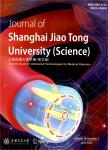Magnetic Flux Leakage Signal Inversion of Corrosive Flaws Based on Modified Genetic Local Search Algorithm
Magnetic Flux Leakage Signal Inversion of Corrosive Flaws Based on Modified Genetic Local Search Algorithm作者机构:Department of Information and Controlling EngineeringShanghai University of Electric Power
出 版 物:《Journal of Shanghai Jiaotong university(Science)》 (上海交通大学学报(英文版))
年 卷 期:2009年第14卷第2期
页 面:168-172页
核心收录:
学科分类:12[管理学] 1201[管理学-管理科学与工程(可授管理学、工学学位)] 07[理学] 08[工学] 070105[理学-运筹学与控制论] 080502[工学-材料学] 0805[工学-材料科学与工程(可授工学、理学学位)] 0701[理学-数学]
基 金:the Innovation Program of ShanghaiMunicipal Education Commission(No.09YZ340) the Leading Academic Discipline Project of ShanghaiMunicipal Education Commission(No.J51301) the Special Scientific Research Project of Scienceand Technology Commission of Shanghai Municipality(No.08240512000) the Shanghai Municipal EducationCommission Scientific Foundation Projection(No.06LZ009) the Shanghai Key Science and TechnologyProject(No.061612041)
主 题:magnetic flux leakage (MFL) corrosive flaw simulated annealing Gaussian mutation
摘 要:In this paper,a modified genetic local search algorithm(MGLSA) is *** proposed algorithm is resulted from employing the simulated annealing technique to regulate the variance of the Gaussian mutation of the genetic local search algorithm(GLSA).Then,an MGLSA-based inverse algorithm is proposed for magnetic flux leakage(MFL) signal inversion of corrosive flaws,in which the MGLSA is used to solve the optimization problem in the MFL inverse *** results demonstrate that the MGLSA-based inverse algorithm is more robust than GLSA-based inverse algorithm in the presence of noise in the measured MFL signals.



